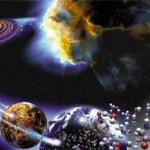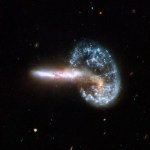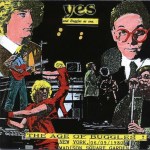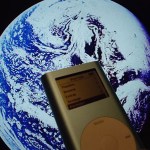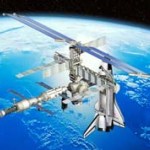space
Me and Junior just got home from the Royal Swedish Academy of Sciences. First we were shown the portrait collection and the main meeting room where a lot of Nobel prizes have been decided. Then, under the joint auspices of the Academy and the Swedish Skeptics Society, we heard an hour's lecture by one of the Society's long-time members: astronaut Christer Fuglesang.
It was a good talk in plain Swedish, ranging from abstruse physics to everyday practicalities of life in space. (If you lose something small inside a space station, just wait a day or two and then look for it near the intake of…
The Phoenix Lander survived touch-down on Mars, has deployed its solar panels successfully and is transmitting pictures! Yay!
Here's the news feed where this baby's discoveries will be announced over the coming months.
As you probably know, the Phoenix has landed on Mars. No problems so far. I assume the best place to track the data as it comes back is the NASA mission page for Phoenix. Here are the mission goals:
--Determine whether Life ever arose on Mars
--Characterize the Climate of Mars
--Characterize the Geology of Mars
--Prepare for Human Exploration
Space, if nothing else, is an awfully pretty place. This week over at Space Cynic lies the 53rd Carnival of Space.
Some of the highlights of this weeks Carnival include the following:
Cosmic Chocolates -- Japanese chocolates designed on the Planets.
The Space Elevator -- We're still a long way away from this one.
The Earth from other worlds -- See what the Earth would look like from Saturn or Mars.
Private Space Tourism -- You've seen Virgin Galactic's plans, now see the Russian plan that will certainly be ready to go much sooner!
Have a great weekend, and don't forget to read and comment…
I wrote my 1990 high-school graduation paper about the search for a trans-plutonian planet. (That's where I got hoodwinked by Zecharia Sitchin.) In its conclusion, I suggested that the search for such close-yet-dim objects could be automated with computer-controlled telescopes and automated image processing.
This is actually what happened. Here's an informative new video clip by my brother in skeptical blogging, Jeff the Blue Collar Scientist, describing work at the privately owned Junk Bond Observatory in Arizona, where asteroids and comets are being sought. Yep, 18 years down the road, in…
The one-year anniversary edition of the Carnival of Space is up at Why Homeschool? If only more homeschoolers were into space, Astronomy, and science in general, the United States would be a far superior place, I'm sure!
Thanks to Henry Cate for starting the Carnival and coming back to host it one year later! My post on a black hole getting kicked out of our galaxy is up there; check it out and find out what's going on in outer space!
(Thanks to Starts With A Bang! reader benhead.) The Hubble Space Telescope has released some beautiful images of colliding galaxies in a huge collection! Here are some of my favorites, with my very own names for them (real name in parentheses).
We'll start with the Glowing Arrow (Arp 148):
The Highway Windshield (NGC 6240)
The Flaming Splinter (NGC 6670):
And finally, I call this one "my new desktop wallpaper:"
I was going to write a whole bunch about this, but I have been beaten to the punch by Universe Today, Bad Astronomy, and Will Gater. I'll have to wake up earlier next time! In the…
As you may have noticed from yesterday's unusual post, today is Earth Day! I thought I'd share with you some of my favorite pictures from space of it, including the famous photograph from Apollo 8 known as Earthrise:
This combination shot made from NASA’s Terra satellite and NOAA’s Geostationary Operational Environmental Satellite:
The known satellites at least 0.1 meters in size in orbit around Earth (there are ~11,000 of them as of April 2005, and another 100,000 between 1 cm and 10 cm in size):
Looking at the Earth and the docked Space Shuttle from the International Space Station:
And…
Fraser Cain over at Universe Today sent out a question to the Astronomy/Astrophysics/Space communication community today. And he asks:
Why should we spend our time/money/resources on exploring space when there are so many problems here on Earth?
This is something that, for better or worse, I had a knee-jerk reaction to. Here's what I wrote back to him:
This is like asking why we should spend money on making our city better when there are so many problems here in our own homes. Or why we should spend money on understanding our whole world when there are so many problems here in our own…
So, what's the deal with this one? startswithabang.com reader Scott Stuart asks the following question:
I was reading "The First Three Minutes" last night and came across an
interesting section about blackbody radiation and energy density. The
author states that as the universe expands, the number of photons
running around (in the CMB, for example) is unchanged, but their
wavelengths get stretched. The energy in a photon is, of course,
inversely proportional to its wavelength, so the energy content of a
photon decreases as its wavelength increases. That seems to mean that
the total energy…
In my mind, and in my car,
we can't rewind, we've gone too far,
pictures came and broke your heart,
put the blame on VTR.
And for those of you who are under the age of 25, VTR stands for Video Tape Recorder. This was the Buggles, who made the first music video that ever appeared on MTV, back when MTV played music videos. (I wonder what the last music video on MTV was? My guess is California Love by Tupac and Dre back in 1996. At least, that's probably the last music video that I've ever seen on MTV.)
But why all this? Because I wanted to tell you about my appearance on The Space Show this…
Tonight, from 7:00 PM - 8:30 PM Pacific Time, I will be Dr. David Livingston's guest on his radio program, The Space Show! I have no idea how it's going to go or if I'll be able to communicate clearly on an audio-only format, as I've never tried before, but I'm really looking forward to the experience.
You can listen live via internet radio by going to http://www.thespaceshow.com/live.htm at the appropriate time, or by heading to the RSS feed afterwards and downloading the episode. Don't forget to leave your comments if you listen to it!
tags: astronomy, solar system, subway art, AMNH, NYC, NYCLife
Since I am having trouble getting out to roam the city and take pictures, I thought I'd return us to the upstairs subway platform at AMNH for a couple days to look at a few pieces that I haven't yet shared with you.
Solar system
as portrayed in tiles on the stairway leading down into the NYC subway stop (A-B-C)
at 81st and Central Park West. (ISO, no zoom, no flash).
Image: GrrlScientist 2008. [wallpaper size].
The lighting over this landing makes this mosaic difficult to photograph, unfortunately, since it is quite…
Well, it's not technically a weekend diversion, but something awesome happened in the wake of my recent Awards-show posting of the Carnival of Space. David Livingston, a blogger over at Space Cynics and a radio host of The Space Show, has invited me to be his guest on his April 8th broadcast of his show!
So get ready to listen up, because this is going to be available worldwide for download! I'll definitely have an entry for you after the recording to let you know how it goes and what we talked about, but I hope to get to talk about all the things that excite me about doing this, including…
tags: astronomy, South Pacific Ocean, sunset, hubble telescope, Image of the Day
Sunset over the Pacific Ocean.
Image: NASA (2007). [wallpaper size].
...literally:
Scientists are priming two spacecraft to slam into the moon's South Pole to see if the lunar double whammy reveals hidden water ice.
The Earth-on-moon violence may raise eyebrows, but NASA's history shows that such missions can yield extremely useful scientific observations.
"I think that people are apprehensive about it because it seems violent or crude, but it's very economical," said Tony Colaprete, the principal investigator for the mission at NASA's Ames Research Center in Moffett Field, Calif.
In the event that shooting the moon fails, we can always nuke it. You can sign…
It's been a spectacular week for the film space industry, and here at Starts With A Bang!, we've got the recap of all the highlights that you may have missed while watching the countless Oscar montages. Take your time browsing and enjoying this site, and maybe even find out what the question is if 42 is the answer! And now, without further ado, here are the winners from the 43rd Carnival of Space, as chosen by Ethan Siegel, your magnanimous host of this week's Carnival (and check out all previous carnivals here):
Nancy Young-Houser, of A Mars Odyssey, for Stellar Breakthrough Performance…
Well, that's good.
The military successfully shot down a satellite whose decaying orbit brought up concerns that it might crash into...you know...something besides water. It had about a half ton of a compound called hydrazine that is explosive and toxic. While it is pretty unlikely that anything that explosive would survive a tumble through the upper atmosphere, the Pentagon thought it was better to be safe than sorry:
The Pentagon announced Monday that the mission to launch a Navy missile-interceptor at a dead spy satellite appears to have succeeded in destroying a tank filled with toxic…
Three awesome things are going on today for you, and I invite you to check them all out:
The latest Carnival of Space is live, where you have your choice of 23 different astronomical topics to choose from. Of course, my post this week on galaxies and how they're made is on there, too!
Pamela L. Gay, cohost of Astronomy Cast, blogger of Star Stryder and all-around great person, saw a press release this week about whether we need dark matter and dark energy. The answer, of course, is yes, but since I'm an expert on that stuff, she came to me and asked me to give my analysis of the…
Ever get sick of your life here on Earth? What about really getting away from it all; what if you wanted to live in space, orbiting the Earth, away from everyone. (At least for awhile, like a summer home.) What would you need to do it, and what would it consist of?
I propose an idea which I'll call a "space house," where I'll go through what I think is the cheapest and easiest way to get all the things you would need to comfortably survive in space for an extended period of time. First off, let's go over all the things a human would need to survive, while still having a good life, in space…
